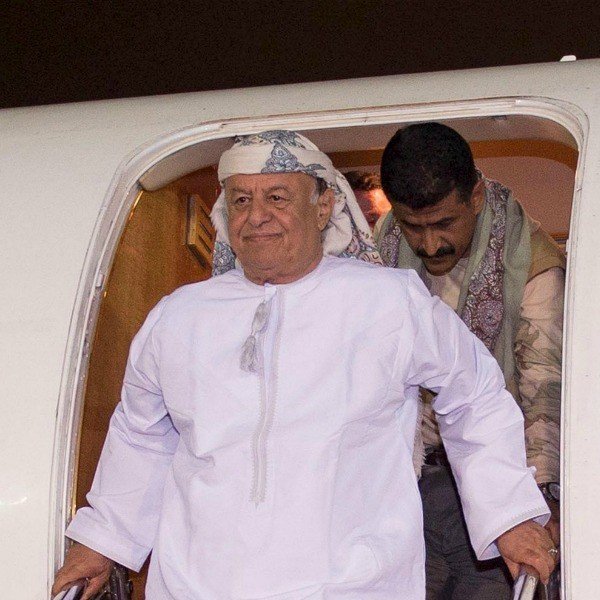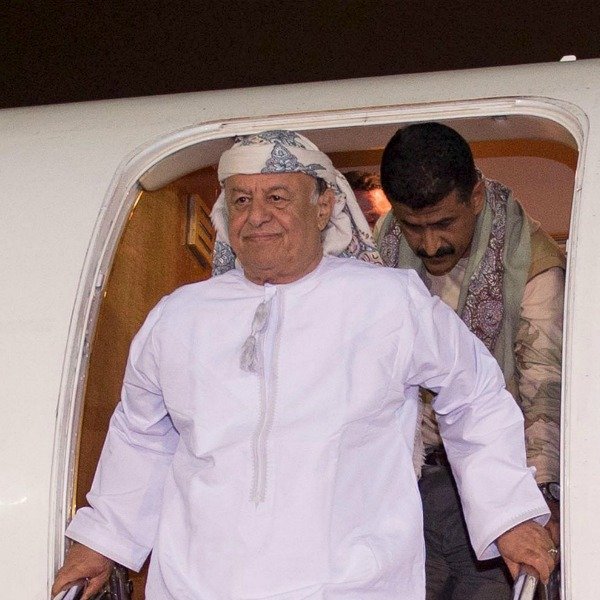Yemeni President Abd Rabbuh Mansur Hadi has left his refuge in Aden under Saudi protection and arrived in Saudi Arabia’s capital Riyadh, officials say, as a Saudi-led coalition continues to launch air strikes against Shia Houthi rebels.
It is the first confirmation of Abd Rabbuh Mansur Hadi’s whereabouts since March 25, when he fled rebel forces in the city of Aden.
The officials say he will go to Egypt for an Arab league summit on March 28.
The Saudi authorities began air strikes in Yemen on Wednesday night, a step Iran called “dangerous”.
During the second night of raids warplanes again targeted rebel positions in Yemen’s capital Sanaa and an air base near the southern port city of Aden.
Reports say there were civilian casualties.
Clashes were also reported in Aden between troops loyal to President Abd Rabbuh Mansur Hadi and Houthi rebels.
Saudi Arabia says it is “defending the legitimate government” of Abd Rabbuh Mansur Hadi.
Abd Rabbuh Mansur Hadi took refuge in Aden last month after fleeing Sanaa, where he had been under house arrest since the Houthis took full control of the capital in January.
On March 27, a Saudi official said he had travelled to Riyadh, but would attend the two-day Arab summit in Egypt as the “legitimate” Yemeni president.
The Saudi ambassador to the US, Adel al-Jubair, said the first wave of airstrikes over targets in Yemen “went extremely well and with no collateral damage”.
He said this was “just the beginning of the campaign” which would carry on until “wisdom prevails” among the Houthi rebels.
Sources say the kingdom would consider sending troops to protect the government if it were to re-assemble in Aden in the future.
Reports said Saudi Arabia was using 100 warplanes in the operation, and its allies would contribute dozens more.
Saudi-owned Al-Arabiya TV reported that the UAE, Bahrain, Kuwait, Qatar, Jordan, Morocco and Sudan were sending aircraft, while Egypt, Jordan, Sudan and Pakistan were ready to take part in any ground offensive targeting the Houthis.
The US said it was providing “logistical and intelligence support”.
However, a Houthi official warned the coalition that it risked provoking a wider war.
Shia power Iran, which Sunni-ruled Saudi Arabia accuses of backing the rebels, also demanded an immediate halt to the strikes, which it said violated Yemen’s sovereignty.
Turkey has accused Iran of trying to dominate the region.
President Recep Tayyip Erdogan said he supported the operation against the Houthis, adding Iran’s stance had begun “annoying us, Saudi Arabia and the Gulf countries”.
“This is really not tolerable and Iran has to see this,” he said.
A conflict that pulls in regional powers could disrupt global oil supplies, and the price of Brent crude rose almost 6% after the strikes began.
Media reports said at least 13 civilians were killed in Sanaa during the first day of the air strikes, and 18 people were killed in clashes between rebel fighters and soldiers and militiamen loyal to Abd Rabbuh Mansur Hadi in southern Yemen.
[youtube dHxZq3alCnQ 650]
